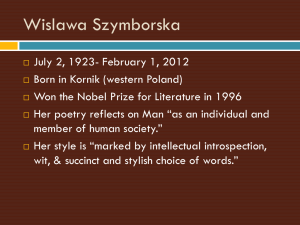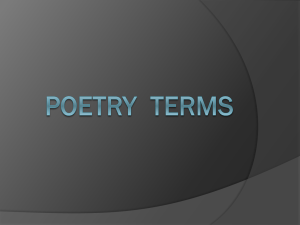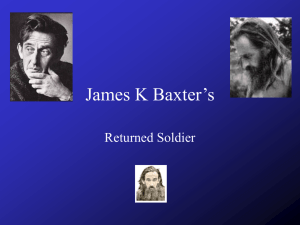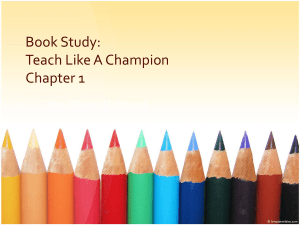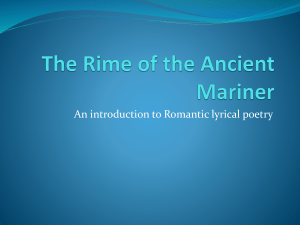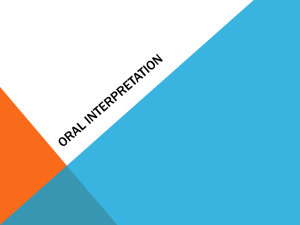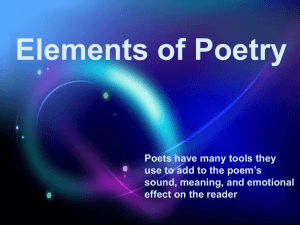Teachers - College of Social Sciences and International Studies
advertisement
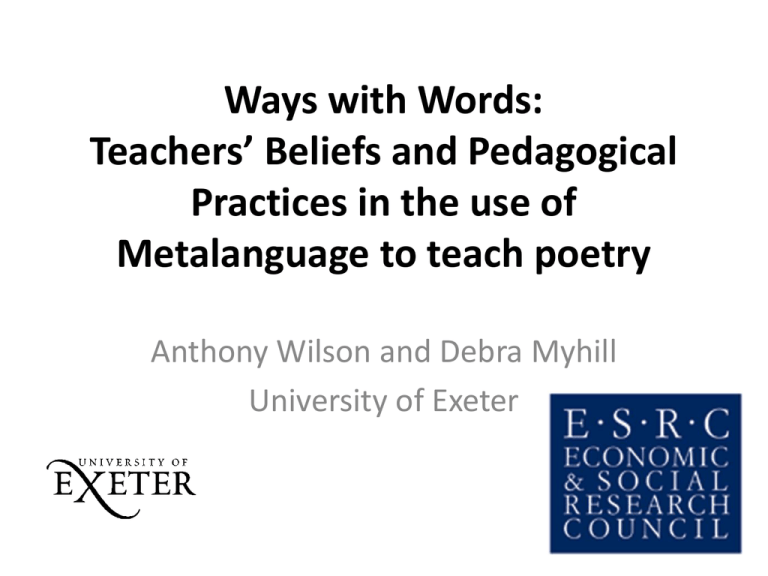
Ways with Words: Teachers’ Beliefs and Pedagogical Practices in the use of Metalanguage to teach poetry Anthony Wilson and Debra Myhill University of Exeter Background to the study • Many teachers avoid teaching the writing of poetry and in secondary (high-school) classrooms; it is more likely to be taught as part of the reading curriculum than the writing curriculum. • Teachers in England have been encouraged to develop students’ metalinguistic understanding through explicit teaching of grammar. • With the teaching of poetry in particular, however, the metalanguage includes both linguistic metalanguage (eg verbs, clauses, subjects) and literary metalanguage (eg metaphors, caesura, enjambement). Writing Poetry • Writing poetry is a process ‘in which every line, every phrase, may pass the ordeal of deliberation and deliberate choice’ (Coleridge, 1817:485). • To make discriminating choices as a writer requires linguistic and metalinguistic competence. • This paper demonstrates how teachers’ pedagogical beliefs and practices about the value of metalanguage in the teaching of poetry is ambivalent and at times contradictory. The research question How do teachers think about literary and linguistic metalanguage in the teaching of poetry? How do teachers define the purpose of using literary and linguistic metalanguage in the teaching of poetry? Do teachers differentiate between literary and linguistic and metalanguage in the teaching of poetry? Theorising Metalinguistics • Metalinguistic thinking is a part of the wider field of metacognition. • Metacognition is a noun; but metalinguistic is an adjective, calling for a following noun: metalinguistic awareness; understanding; knowledge… (Gombert 1992) • The ability ‘to take language as the object of observation and the referent of discourse’ (Camps and Milian1999:6), • ‘The ability to objectify language and dissect it as an arbitrary linguistic code independent of meaning’ Roth et al (1996:258). Metalinguistic knowledge • Explicit metalinguistic knowledge is defined as ‘knowledge that can identify and account for connections and distinctions between different examples of usage, enhance reading and improve writing’ (QCA 1998:20). • The goal of acquiring such metalinguistic knowledge is to develop a repertoire of tools for writing: the ability ‘to control and manipulate the material at hand’ is more significant than the ability ‘to describe a linguistic feature using grammatical term inology’ (Van Lier 1998:136). • In classrooms this is supported by the use of metalanguage (e.g. grammatical and literary terms). • Metalinguistic discussion can occur without the use of metalanguage. Methodology • RCT investigating the impact of contextualised grammar on students’ writing attainment • 32 schools from the South-West and the Midlands of England • One class of 12 year olds in each school as the student sample (n = 855) • 32 focus students (one per school, stratified by gender) • 32 participating teachers (one per school) • 3 schemes of work focusing on writing narrative, argument and poetry • Intervention group had detailed teaching materials which embedded grammar purposefully within the teaching Methodology • 32 interviews with teachers about their beliefs and practices in teaching poetry • 32 lesson observations of poetry writing lessons • 32 interviews with students about their thinking about writing poetry. • Open and axial coding using NViVo Findings • Teachers use literary metalanguage freely when talking about poetry • There is a lack of confidence or awareness of the possibilities of addressing linguistic metalanguage in poetry • Perception that linguistic metalanguage (grammar) imposes rules on poetry writing Findings The willingness of teachers to use literary metalanguage freely when talking about poetry We teach them from quite an early stage about the importance of focusing on key words and their effect on the reader, so it comes down to having a technical vocabulary. I would expect to teach metaphor and simile, and to look at why they’re effective. You can show students how to recognise how the poet has crafted his work and how he’s done it though word choice, punctuation, how you know there’s repetition for effect, alliteration, can’t remember if I said that, onomatopoeia all of those things, so you can point those things out if that’s what teaching poetry is. Findings The relatively limited repertoire of literary metalanguage used Rhyme Metaphor Simile Rhythm Alliteration Enjambement Personification Iambic pentameter Sibilance Assonance Caesura Metre 60 20 20 18 12 9 8 4 3 2 1 1 The Schemes of Work explicitly addressed enjambement, caesura, personification and rhythm Findings Some teachers express uncertainty with literary metalanguage My biggest struggle with poetry is kind of like metre and rhythm One of the things that I’d really have to go over is…iambic pentameter I feel less confident at what I would consider to be, maybe the more technical poetry, things like enjambment…I can teach what it is…but I find it difficult to explain how they should use it I worry about the fact that, in some respects, I worry about the terminology and getting it right and, is this the right terminology…I sort of get het up on all the kind of terminology, and trying to get that over because, that’s what I always worried about when I was at uni Findings Some express concern that literary metalanguage is used without links to meaning The creativity with poetry…is always a hard balance because if you want them to be successful with language…how far do they need to know the terms? I have done work with them on creating metaphors and similes and onomatopoeia…I think I’ve always found teaching poetry… by doing it that way, I find it slightly stifling to creativity. They’ve either got it or they haven’t…and although you can teach them certain techniques, you just can’t teach creativity…you can prompt it, but I don’t know if you can teach it. When I was teaching personification…I really wanted them not to see it as an effect…I talked about the definition of it at the beginning but I wanted them to see it in the context of a poem, and appreciate the effect it had, not ‘this is a personification poem’. Findings Some teachers display a ‘formulaic’ attitude to literary metalanguage We used to use ‘The Highwayman’…and it was great for teaching onomatopoeia, metaphor, simile, blah blah blah, metaphor. I told them…they had to use the techniques that we’d…explored in the poetry so I wanted them to use imagery and I wanted metaphor in there and I wanted simile and personification. Very descriptive or…long words and it’s got to…have caesura in it and…enjambement and it’s got to have metaphor, somewhere it’s got to have a simile. Findings Lack of confidence or lack of awareness of the possibilities addressing linguistic metalanguage in poetry I’ve never usually done it for poetry apart from obviously say add in adjectives and things like that for the poetry. [I’ve looked at] the imagery and the different techniques…that have been used … I’ve not gone into the line order and the noun phrases because I don’t really…understand them. Normally I would have been quite confident with doing poetry. I suppose I never really thought about sentence level as much in poetry because…it’s almost there isn’t it. You wouldn’t teach [punctuation] in the same way that you would teach…sentence patterns in writing to argue…because if they didn’t have any punctuation in it, you wouldn’t necessarily say that’s a bad thing. Findings Rejection of linguistic metalanguage because it imposes rules – poetry gives freedom from rules I think it’s important to know the order in which things come usually, so that when you’re writing a poem, you can break out of those rules, and when you’re writing a creative story, you can break out of those rules, and make different word and sentence choices I think in lots of things, in the teaching of English, probably from primary school up to since the Strategy’s been there, has worked against, kind of real freedom of expression because they’ve been taught a lot of rules and they associate the subject with a lot more rules than perhaps it was when I was at school. What I wanted them to learn, I think, it was all about just the variety and the fact that they can have that freedom to create things themselves and not to just be rigid in their selection and to follow a formula Subject Knowledge Issues Maybe it’s more to do with the fact that I feel more confident teaching those [literary metalanguage], or that they’re more accepted, and so there are different resources that I can use to teach those than actually breaking it down to a word, or like a metaphor can be like an extended piece of writing can contain metaphors and similes we’re not looking at an isolated sentence I: So what for you is the difference between the terminology of caesura and enjambment as specialist meta language and grammatical meta language? A: Because I’m more secure with that than I am with my grammar…I can teach caesura and enjambement much better than I can subordinate clause and complex sentence Preliminary Conclusions Is the apparent preference for using literary metalanguage over linguistic metalanguage an indication of a crisis of confidence • In terms of subject knowledge? • In terms of understanding the purpose and value of linguistic metalanguage? Discussion Why do teachers appear not to see the connection between poetry and linguistic metalanguage? Is the apparent preference for using literary metalanguage an indication of a lack of trust in linguistic metalanguage? In spite of the potential for using metalanguage in teaching poetry reading and writing, do teachers unconsciously describe poetry as a ‘grammarfree’ zone?


